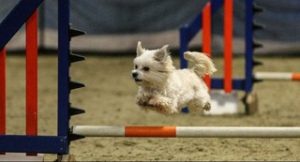Anal Gland Problems in Dogs.
Although a somewhat unsavoury subject, many dogs unfortunately suffer from problems with their anal glands at some stage in their life. Unfortunately, some dogs have recurring bouts of anal gland problems throughout their lives. It is a common condition in dogs and although it can be painful, it is usually treatable. This Holidays4Dogs article will provide information regarding anal gland problems in dog and what treatments are available.
The anal sacs in a dog are situated just inside the dog’s rectum. It consists of two, small, oval shaped, glands. The glands are not easily visible, but they do produce a pungent, oily substance, that works as a territorial marker. This odour relays information from dog to dog – this is why dogs will often sniff each other’s rear ends when they meet.
Anal glands are also there to help rid the body of toxins. Obesity, due to a high carbohydrate diet, can also be a factor associated with anal gland problems.
Diet.
If
stools are a normal solid consistency, the fluid filled ducts within the anal glands will naturally empty under the pressure of the faeces as they pass through the rectum. However, if the dog has loose, or irregular bowel movements, this can lead to problems with the anal sacs.
Processed foods can often produce softer stools. In particular, some dogs are allergic to grains – namely wheat – found in processed pet foods. Therefore, eliminating these from a dog’s diet can help reduce, or cure anal gland issues.
Potato, corn, oatmeal, wheat and rice are all said to exacerbate anal gland dysfunction. Feeding a bones and raw food (BARF) diet to dogs with recurring anal gland problems can help to rectify the problem as this tends to produce a firmer stool.
Toxins.
The anal glands play a major part in the process of body detoxification. Therefore, when the toxin levels are high, the anal glands can often become inflamed. Processed dog food can exacerbate anal gland problems in dogs. Even certain dog treats, such as rawhide chews, contain toxins, which put a strain on the liver.
Obesity.
When a dog becomes overweight, his anal sacs can become blocked by folds of skin which block the pores. In addition, an obese dog is less able to groom himself to aid natural emptying.
Position of anal glands.
In certain breeds of dog, such as the pug, the location of the anal gland is not positioned correctly. This means the pressure required to express the glands is not working in the right place. Corrective surgery is possible in some cases.
Spine and muscle injury. 
One of the factors associated with anal gland problems is neck and back pain.
Many high performance dogs can suffer with anal gland problems as a result of trauma, or injury to the lower spine.
Such injuries may not always be obvious. Restricting sprinting and twisting associated with sports, or ball retrieving for instance, may help to reduce the negative effect on the anal glands.
Routine anal gland expressing.
Many people, including vets and groomers, recommend routine drainage of the anal glands. However, these are delicate glands and unnecessary manipulation can lead to ineffectiveness of the glands to empty naturally.
Routine emptying of the anal glands, therefore, is not recommended. A dog with possible anal gland inflammation will present with one or more of the following symptoms below.
Only then should emptying of the glands be considered – (and after veterinary consultation).
Symptoms of anal gland inflammation.
‘Scooting’ – dogs with inflamed anal glands will often scoot their bottoms along the floor in a sitting position in an effort to eliminate the discomfort.
Tail chasing.
Chewing the rear end.
Visibly inflamed anus.
Foul, or fishy, smell emanating from the rear end.
Constant itching, or scratching.
Dogs can also manifest with a persistent cough gained from licking an infected area.
If you suspect your dog is suffering from anal gland problems, you should seek veterinary attention straight away. Anal gland problems are unlikely to go away on their own and it can be a very painful condition for your dog. Complications can arise where abscesses, or infections develop, and this will definitely require veterinary intervention. Do not try and drain anal glands yourself.
This article is intended for information only and not as a substitute for veterinary attention. Always seek the advice of a veterinary surgeon about all matters relating to your dog’s health.




